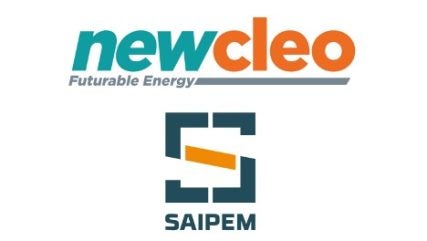
Italy’s Saipem and UK-based nuclear start-up newcleo have signed a collaboration agreement to identify innovative solutions for the offshore application of newcleo’s nuclear technology. The agreement includes a feasibility study on the development of floating nuclear prototypes.
Newcleo said the agreement is to study the application of newcleo’s Small Modular Lead-cooled Fast Reactor (SM-LFR) technology to provide electricity and process heat to oil and gas offshore installations. The agreement also allows for the possibility of extending the use of newcleo’s technology to produce electricity through floating nuclear units, connected to the electricity grid on land or to other users.
Saipem’s interest in nuclear energy is part of its technological development programme, dedicated to energy transition, with the aim of helping to achieve Net Zero objectives by 2050. Saipem intends to evaluate, the potential application of the new generation of small modular reactors (SMRs) for offshore plants.
Alessandro Puliti, CEO of Saipem, stated: “With this collaboration agreement, we leverage Saipem’s distinct skills in the offshore sector as well as our ability to bring innovation to the world of energy infrastructure, to explore new solutions that can accelerate the path towards decarbonisation.”
Stefano Buono, CEO of newcleo said Saipem is an ideal partner for newcleo, “which aims to collaborate with the main players in the energy world to promote technological innovation for a sustainable future”.
Since its launch in 2021 newcleo has signed a long list of agreements, acquisitions and collaborations. Newcleo initially announced its incorporation with the closing of a $118m initial capital raising and the acquisition of Hydromine Nuclear Energy.
Newcleo aims to commission a 30 MWe lead-cooled fast reactor (LFR 30) by 2030 in France, as well as a pilot unit for the manufacture and multi-recycling of mixed oxide (MOX) fuel for fast reactors. Following the construction of the LFR-30 and MOX plant in, newcleo plans to construct a 200 MWe first-of-a-kind commercial unit (LFR-AS-200) in the UK by 2033.
The newcleo website, which now includes a mock-up of its reactor design and some additional technical information, claims to “capitalise on 30 years of R&D activity in metal-cooled fast reactors and liquid-lead cooling systems. Currently, however, the only operating liquid metal-cooled fast reactors are in Russia, using sodium as the coolant.
Russia is also constructing the world’s first lead-cooled small modular reactor (Brest-OD-300) in Seversk as part of a facility to demonstrate an on-site closed fuel cycle, including novel fuel fabrication. This reactor, based on decades of complex research and development, and supported by the entire Russian nuclear industry, is due to begin operation in 2029. By comparison, despite its rapidly growing list of acquisitions and co-operation agreements and optimistic timeline, newcleo’s technology remains in the very early conceptual design stage.






